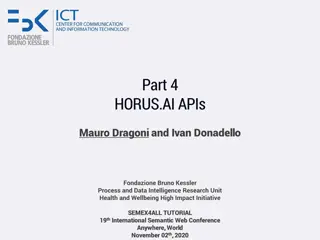Two Methods to Observe Tutorial
This tutorial presents two methods for observing presentations - the Standard Method, which allows resizing to user preference, and the Slide Show Method, which fills the screen. It covers transaction procedures, equipment history, parts identification, and more in an easy-to-follow format. Follow along to learn in detail!
Download Presentation

Please find below an Image/Link to download the presentation.
The content on the website is provided AS IS for your information and personal use only. It may not be sold, licensed, or shared on other websites without obtaining consent from the author.If you encounter any issues during the download, it is possible that the publisher has removed the file from their server.
You are allowed to download the files provided on this website for personal or commercial use, subject to the condition that they are used lawfully. All files are the property of their respective owners.
The content on the website is provided AS IS for your information and personal use only. It may not be sold, licensed, or shared on other websites without obtaining consent from the author.
E N D
Presentation Transcript
THE END OF THE AFFAIR BY GRAHAM GREENE Character Analysis and Themes
INTRODUCTION First published in 1951 in England. Setting: England during World War II. Within this setting, Greene explores themes of love and hate, faithfulness, and the presence of the divine in human lives.
MAURICE BENDRIX The protagonist, the story s narrator, and Sarah s lover. He is a selfish, immature, insensitive, and cynical man. He is a moderately successful writer who met Sarah Miles while doing background research on her husband for a novel he wanted to write. As a writer, he is unable to become truly great in the eyes of critics because his work is too polished. His control over his fiction mirrors the control he strives to have in his life. His physical imperfection one leg is shorter than the other prompts him to reject people before they can reject him.
MAURICE BENDRIX (2) Bendrix and Sarah partake in a passionate love affair from the beginning of World War II until 1944. Sarah calls him Maurice, but everyone else calls him Bendrix. Emotionally, Bendrix is an extremist. He lacks the emotional maturity to feel anything moderately; he is either madly in love with Sarah or he hates her passionately. The only topic about life to which he is indifferent is religion. After Sarah s death, Bendrix begins believing in God, but his belief is colored by hatred as he lashes out at God for coming between him and Sarah.
SARAH MILES The second protagonist, Henry's wife, and Bendrix's lover. Because Henry is unable to sexually satisfy her, Sarah participates in a series of affairs throughout their marriage. Her love relationship with Bendrix is complicated. While she seems to find in Bendrix what is missing in her marriage with Henry, she is not open about it. Sarah is a person of pleasure and selfishness until she has a traumatic experience during which she vows to God that she will be virtuous if He will save Bendrix. Her bargain with God forces her to look deep inside her morality.
SARAH MILES (2) She emerges from her spiritual struggles a stronger, more loving and virtuous woman. Not only does she refuse Bendrix's advances after her vow, she also prays that he will be given the same spiritual peace she has found. Sarah s death brings Henry (who has since learned of the affair from Bendrix himself) and Bendrix together. After her death, a series of miracles are attributed to her, and she ascends to the level of saint in the eyes of those who knew her. Critics have commented that Sarah's life story reads like that of a saint's life; she abandons a life of mortal pleasures to devote herself to God, dies unjustly, and performs loving miracles on Earth.
HENRY MILES Henry is Sarah's husband. Henry is a pleasant, but introverted man who lacks the passions that color Bendrix. Henry is oblivious to his wife's affair until Bendrix has her investigated by a private detective. When Henry figures out that his wife and Bendrix were once involved with each other, his response is calm disappointment. Upon Sarah's death, Henry calls Bendrix and the two become friends.
MR. SAVAGE The discreet private detective that Bendrix hires to have Sarah followed. Bendrix learns of Mr. Savage from Henry, who suspects that Sarah is having an affair but is uncomfortable with actually hiring a private detective to uncover the truth. Mr. Savage and Bendrix only talk once, but he assigns Mr. Parkis to the case.
MR. PARKIS Mr. Parkis is hired by Bendrix to discover whether Sarah is having an affair. The investigation takes place after Sarah's relationship with Bendrix has ended. Mr. Parkis is enthusiastic about his job and even brings his son, Lance, with him to teach him the family trade, which creates comic moments in the novel. He develops a genuine liking for both Sarah and Bendrix and even shows up to Sarah s funeral.
LANCE PARKIS Mr. Parkis's son. His father involves him in detective work. Lance is also the recipient of one of Sarah's miracles. After becoming ill with something requiring surgery (possibly appendicitis), Lance requests a memento from Sarah, who made an impression on Lance. Henry sends one of her childhood books without noticing that she wrote an inscription in it about reading it while sick in bed. Not long after receiving the book, Lance mysteriously heals overnight, and Mr. Parkis sends the book back to Henry and Bendrix with a letter about what happened. Lance is named after Sir Lancelot from Arthurian legend. Parkis named his son Lance because he mistakenly believed that Lancelot was the knight who found the Holy Grail.
RICHARD SMYTHE Richard Smythe is an atheist who regularly goes to a public park to speak to passersby about the nonexistence of God and passes out cards with his sister, Miss Smythe, inviting people to talk privately with him in his apartment Richard Smythe is an acquaintance of Sarah; she contacts him during her spiritual struggle. He is a rationalist who has an impressive library and engages in spirited debates with her. His efforts to convince her that God does not exist, however, only serve to bolster her belief that He does. Richard has "livid spots" on his left cheek, but they miraculously disappear after Sarah's death. Because this was something about which she felt compassion, he assumes that she is responsible for the miracle.
FATHER CROMPTON A Catholic priest who shows up at Henry s house after Sarah s death to try to convince Henry to give her a proper Catholic burial instead of having her cremated. Father Crompton reveals that Sarah had come to him and shown an interest in becoming Catholic. Bendrix successfully persuades Henry not to do it.
MRS. BERTRAM Sarah s mother. Mrs. Bertram didn t regularly visit Sarah and Henry, as she s convinced that Henry doesn t like her. Mrs. Bertram regularly finds excuses to ask Henry for money and even asks Bendrix for a few pounds after meeting him for the first time at Sarah s funeral. At lunch with Bendrix after the funeral, Mrs. Bertram reveals that she had had Sarah baptized as a Catholic when she was just a toddler out of spite for Sarah s father, who didn t like Catholicism and didn t want Sarah baptized.
PETER WATERBURY Peter Waterbury is a literary critic who is going to write an article about Bendrix and his works. Waterbury meets with Bendrix on the day of Sarah s funeral to interview him and get his opinion on other writers, but Bendrix quickly loses interest.
SYLVIA Sylvia is the young and beautiful prot g of Peter Waterbury, a literary critic who meets with Bendrix the day of Sarah s funeral. Initially, he seems ready to seduce Sylvia. However, Bendrix realizes that he can t pretend to really be interested in Sylvia because he s still in love with Sarah.
LOVE AND HATRED The only thing that compares with the love Bendrix feels for Sarah is the hatred he also has for her. Bendrix is entirely consumed by his affair with Sarah even after it ends. Sarah, too, goes through periods in which she hates Bendrix and writes in her diary, I ve hated Maurice, but would I have hated him if I hadn t loved him too? In the middle of all this is Sarah s husband, Henry, who doesn t learn about the affair until nearly two years after it ends and, even then, is incapable of hating either of them, but insists that he loves his wife and eventually comes to love Bendrix after Sarah s untimely death. Through the story of Bendrix and Sarah s affair and its aftermath, Graham Greene illustrates that hatred can t exist without love.
FAITH, ACCEPTANCE, AND THE DIVINE The existence or nonexistence of God or some other supreme deity is something that Bendrix and Sarah are initially indifferent about when they begin their passionate love affair. However, when Sarah assumes that Bendrix is dead, she suddenly turns to God, and ends their relationship. The literal end to the affair between Bendrix and Sarah, is the beginning of a spiritual journey that transforms their lives entirely. Ultimately, each character accepts God as a reality. However, the story depicts this acceptance not as a heartwarming and welcome experience but as a painful one that life has forced upon each of the characters.
JEALOUSY AND PASSION Maurice Bendrix and Sarah Miles engage in a passionate love affair that turns toxic due to Bendrix s intense jealousy. Sarah, on the other hand, is never jealous and struggles to understand Bendrix s feelings. Even when their relationship ends and Sarah passes away, Bendrix s jealousy prevents him from moving on and finding a healthier and happier relationship elsewhere. Through Bendrix, Greene explores the self-destructive nature of jealousy, highlighting how it can infect even the happiest relationships.
JEALOUSY AND PASSION (2) Bendrix calls his feelings for Sarah passion instead of love, implying that he knew his feelings for her were out of control. Not even Sarah s death puts and end to Bendrix s jealousy, but rather causes him to project his resentment toward Sarah s other partners onto God. His irrational belief is that he had a right to Sarah and her body and sees her death as an act of infidelity on her part. In the end, Bendrix discovers that he has become afraid of love, making himself the final victim of his own irrationality.
ADULTERY, DECEPTION, AND HONESTY Over the course of the book, Greene argues that the most powerful force in human nature is the desire to live honestly, a desire which can overcome even the most intense romantic affairs. Initially, both Bendrix and Sarah seem untroubled by lying to Henry, who is blissfully ignorant of the reality of their friendship. However, the knowledge that they are in an adulterous relationship taints Bendrix and Sarah s potential for happiness, as they both long for a relationship marked by honesty and openness. In the end, Sarah and Bendrix do come clean about their relationship but after centering their relationship around lies and deceit for so long, they find that they can no longer have an honest relationship with each other. After Sarah s death, Bendrix has an outburst at both Henry and Father Crompton, a Catholic priest who comes to visit, calling Sarah a tart and blaming Crompton and God for [taking] her away from all of us.























